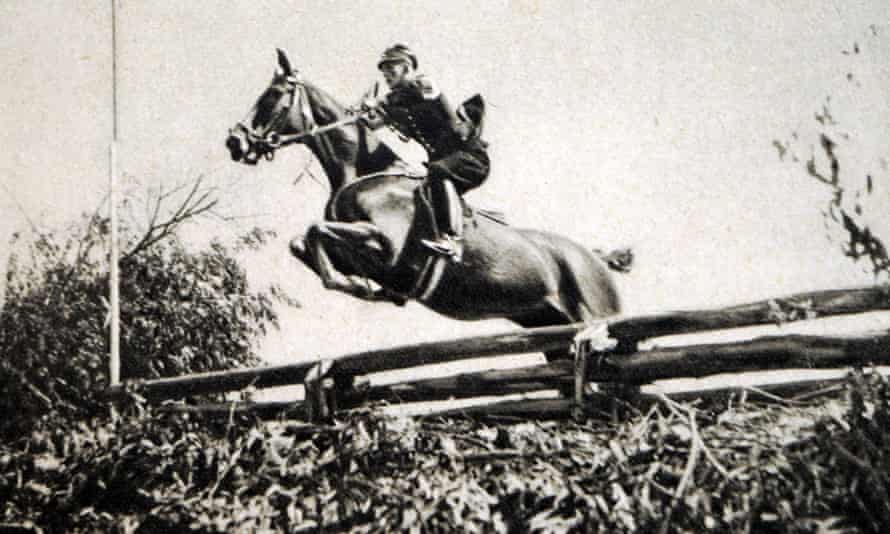
Now here’s an intriguing proposition for Guardian readers, a letter from Major General EHH Allenby, inspector of cavalry, aka the Bloody Bull, on behalf of the British Olympic Council, published on Thursday 7 August 1913, calling for volunteers to step forward for the British team in the new Olympic discipline of modern pentathlon at the Berlin Games in 1916. “The competition consists of the following five events,” Allenby explained, “revolver or pistol shooting at a whole figure decimal target, distance, 25m, swimming, 300m free style, fencing, weapon; epee, riding cross-country, 5,000m, cross-country running, 4,000m.” Tempted?
The Guardian, it has to be said, didn’t go in much for modern pentathlon at the time. The very first competition, at the Stockholm Games in 1912, only made a single line at the foot of an article about the continuing controversy in the Olympic tug-o-war, in which the “redoubtable British team”, drawn from the ranks of the City of London police, were disqualified when they fell over in a heap because they lost their footing. But the new sport was a striking idea, designed by the International Olympic Committee’s founder, Pierre de Coubertin, “to test a man’s moral qualities as much as his physical resources and skills”. The winner was meant to be “the ideal, complete athlete”.
De Coubertin modelled it on the “romantic rough adventures” of a cavalry officer trying to deliver a message back from behind enemy lines. “His horse is brought down in enemy territory; having defended himself with his pistol and sword he swims across a raging river and delivers his message on foot.” A century later, the sport’s governing body, the UIPM, has apparently voted to swap the horses for bikes, an idea which will turn the event into an armed triathlon, and will, inevitably, somewhat diminishes the whole “rough and romantic” aspect of it, by turning the event into the derring-do adventures of an officer who catches a flat. Sharpe’s Puncture.
The horses have always been a problem. In 1912 De Coubertin was, apparently, “very upset” because the Swedes expected all the competitors taking part in “his baby” to bring their own rides with them. De Coubertin had already had to give up on the idea of including a rowing race as one of the five disciplines, because it would have made the organisation “even more difficult”, and, as he admitted, “it was already quite complicated enough”. Now this. He insisted that the competitors couldn’t be expected to bring their own mounts, so the only solution was that the athletes would draw them from a pool of horses provided by the hosts. Which is how it has been ever since.
It has become, oddly enough, one of the event’s defining features. The job of taking a strange new horse and, after 20 minutes’ preparation, trying to guide it around the course, is one of the most wildly unpredictable in all the Olympic events, and there are countless stories competitors who were foiled, after four years of dedicated training, because the misfortune to draw a surly and unwilling nag. It is an extreme test of horsemanship. You guess old EHH Allenby, who was known to fly off the handle when his junior officers split their infinitives and once exploded in anger when he saw a corpse without its regulation tin helmet, would agree.
Which is why it was such a surprise to find that the sport has been going around in circles on this particular argument for a long time. The legendary Jim Fox, who won team gold for Great Britain at Montreal 76, has been an advocate for years. “In my day I argued they should have exchanged the horse for a motorcycle,” Fox told the Guardian in 1992, “but they didn’t like the idea of motorised assistance in the Olympics. Why not a mountain bike?” Back then, the modern pentathlon was under threat from De Coubertin’s successor Juan Antonio Samaranch, who wanted to replace it with a sport people actually take part in, such as golf or tennis.

In the end the UIPM scrapped its team event, brought in a women’s competition and cut the event down from four days’ duration. Samaranch was still determined to junk it. Then they made him a vice-president of the governing body, which seemed to fix the problem. He was even made an inductee into the “modern pentathlon hall of fame”, for his “tireless efforts to modernise the sport”, which is a quaint way of describing his repeated attempts to kill it off. But the sport still struggles to justify its place on the Olympic programme, which is why the cross-country running and shooting phases were combined into one event.
It survives, in large part, because of the IOC’s own sense of tradition, and the support of a handful of influential administrators. Even they might struggle to save it from the reputational damage caused by the sight of a well-respected coach punching one of the horses in Tokyo this summer. And really, the sport is overdue for renewal, before it goes the way of bicycle polo, ballooning, tug of war, and all the other dead Olympic events.
Sign up to The Recap, our weekly email of editors’ picks.
The five events they chose to include more than a century ago are so antiquated now that they make modern a misnomer. If the IOC wants to save it, it’s not the original disciplines that matter, but the spirit in which they were picked, and the idea that they ought to be a test of moral qualities, physical resources and skills. Here then, is another proposition for Guardian readers: a century later, what are the five events that ought to go into a properly modern pentathlon?
